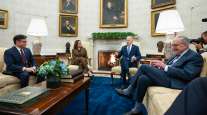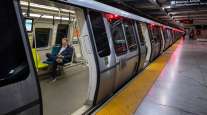Senior Reporter
US House Leaders Plan Late May Highway Bill Markup

[Stay on top of transportation news: Get TTNews in your inbox.]
Legislation that would modernize the country’s surface transportation operations, with attention to trucking policy, is expected to reach a committee in the U.S. House of Representatives next month.
The leadership of the Transportation and Infrastructure Committee plans to take up their multiyear policy update of the nation’s main highway law prior to the Memorial Day recess.
Aides with knowledge of the committee’s calendar told Transport Topics a hearing on the highway policy update would occur toward the end of May.
Democrats in the congressional majority are proposing for their highway policy legislation to help pave the way for the modernization of nearly every corner of the surface transportation network, including freight corridors. Specifically, the highway bill would reauthorize provisions from a 2015 law called the FAST Act. That law expires at the end of September.
The bill also would be central to Democrats’ consideration of a version of President Joe Biden’s $2.25 trillion American Jobs Plan infrastructure proposal. Speaker Nancy Pelosi (D-Calif.) called on colleagues to advance comprehensive infrastructure legislation by July 4.
Committee Chairman Peter DeFazio (D-Ore.), who would oversee the highway bill’s markup hearing in May, emphasized the goal of reinforcing severe-weather resilience across coastal corridors, expanding market access for electric and autonomous vehicles, and tackling myriad concerns, such as a reported lack of access to parking for truck drivers. A long-term funding mechanism that would accompany the legislation has yet to be debated.
“It has become even more clear that communities across the country, both urban and rural, need transformational infrastructure investments to improve the lives of all Americans,” said DeFazio. “By modernizing our infrastructure, we can create millions of jobs, become more competitive in the global economy, make transportation more affordable and equitable, create more livable communities and reduce carbon pollution from the transportation sector that is driving the climate crisis.”
This is “our moment” to move infrastructure out of the Eisenhower era and into the 21st century and beyond, the chairman added.
The most expensive maintenance is no maintenance. That's why we need big, bold investments in the American Jobs Plan - so we can rethink, rebuild, and modernize our crumbling infrastructure to create good paying jobs & turbocharge our global competitiveness. #BuildBackBetter — Nancy Pelosi (@SpeakerPelosi) April 12, 2021
“We finally have a partner in the White House who is committed to making transformative investments that will shape our economy in a way that meets the moment,” Rep. Rosa DeLauro (D-Conn.), chairwoman of the Appropriations Committee, told the transportation panel this month. “Infrastructure is the lifeblood of our economy, and I strongly believe it must be the central component of a long-term national growth strategy that returns us to a country that builds, rather than one that just consumes.”
DeLauro and her House colleagues recently presented their proposals ahead of the highway legislation’s consideration. Rep. Angie Craig (D-Minn.) sought support for her effort to expand parking access for truckers working around the country. She said her intention is to “improve the safety of commercial motor vehicle drivers.”
Last month, Craig and Rep. Mike Bost (R-Ill.) introduced the Truck Parking Safety Improvement Act. The bill would seek to dedicate U.S. Department of Transportation funding for state facilities that provide parking for trucks. Under the measure, $125 million would be authorized for fiscal 2022, with incremental funding increases through fiscal 2026. The legislation also would require state and federal officials to report to Congress on the legislation’s impact on the freight industry.
“We’ve seen the need for more trucks and drivers increase significantly, especially during the COVID-19 pandemic when trucking helped to keep our economy going. However, the number of truck parking spaces hasn’t kept pace,” Bost said during the bill’s introduction in March.
Besides truck parking, House members pressed the committee’s leadership to consider provisions pertaining to climate change, freight connectivity, public health initiatives, electric vehicles, access to ports, rural broadband, inland ports, Amtrak’s operations and transit systems, among other issues.
We’ve seen the need for trucks & drivers increase significantly since my days driving over the road & running our family trucking business. But the number of truck parking spots hasn’t kept pace. Drivers are forced to park in unsafe locations, putting themselves & others at risk. pic.twitter.com/Wr5zoizLv2 — Rep. Mike Bost (@RepBost) March 29, 2021
For instance, Rep. Jamaal Bowman (D-N.Y.) highlighted equity concerns: “We can’t be satisfied by just fixing highways, or increasing the number of electric vehicles on the road. As with all of our infrastructure, whether we’re talking about physical or social infrastructure, we need to rethink and rebuild from the ground up. We need to heal the wounds of history.”
“We need to reconstruct these systems based on principles of care and love for all people, and for the planet we share,” Bowman added.
Rep. David Cicilline (D-R.I.) pressed for wastewater improvements: “I urge the committee to establish a new grant program that specifically addresses the needs of wastewater infrastructure in financially distressed municipalities. All Americans should have access to safe and clean water.”
Top Republicans, meanwhile, are proposing fellow policymakers dedicate their attention to surface transportation issues. This would mean repairing stretches of highway, ameliorating thousands of bridges and improving connectivity at ports.
Committee ranking member Rep. Sam Graves (R-Mo.) and Highways and Transit Subcommittee ranking member Rep. Rodney Davis (R-Ill.) expounded the argument: “We cannot lose sight of what a highway bill should do: improve our critical transportation network. As such, any transportation bill we would support must prioritize core infrastructure, including fixing and building roads and bridges, and making this infrastructure more resilient.”
Want more news? Listen to today's daily briefing below or go here for more info:




